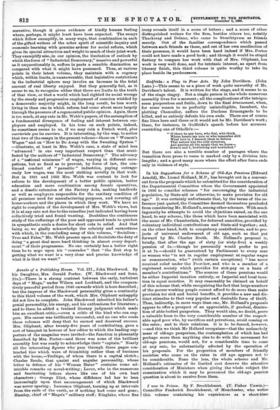In his Suggestions for a Scheme of Old-Age Pensions (Edward
Arnold), Mr. Lionel Holland, M.P., has brought out in a conveni- ent form the proposals which he submitted for the consideration of the Departmental Committee whom the Government appointed in 1896 to consider schemes " for encouraging the industrial population, by State-aid or otherwise, to make provision for old age." It was certainly unfortunate that, by the terms of the re- ference just quoted, the Committee deemed themselves precluded from considering Mr. Holland's, among other schemes. With much ingenuity he attempts to avoid the objections raised, on the one hand, to any scheme, like those which have been associated with the name of Mr. Chamberlain, for deferred annuities, provided by voluntary individual contributions and State-aid together; and, on the other hand, both to compulsory contributions, and to pro- jects of universal endowment of old age, such as that put forward by Mr. Charles Booth. Mr. Holland's proposal is, briefly, that after the age of sixty (or sixty.five) a weekly pension of 5s.—though he personally would prefer to put it at 7s.—should be guaranteed by Parliament to every man or woman who "is not in regular employment at regular wages or remuneration, who" (with certain exceptions) " has never received relief under the Poor-law, and who is a member of a registered society which provides for sick-pay on a basis of member's contributions." The sources of these pensions would be either Imperial taxation entirely, or Imperial and local taxa- tion in equal moieties. It may reasonably be claimed on behalf of this scheme that, while recognising the fact that large numbers of the poorer working people cannot afford to do more than make provision for sick and burial benefits, it provides a new and dis- tinct stimulus to that very popular and desirable form of thrift. Thus, indirectly, in more ways than one, Mr. Holland's proposals appear to offer a prospect of an appreciable, if gradual, diminu- tion of able-bodied pauperism. They would also, no doubt, prove a valuable boon to the very considerable number of the respect- able aged poor who, by sacrifices and privations, avoid coming on the rates ; and to their relations. It is to be feared, however, —and this we think Mr Holland recognises—that the melancholy mass of old-age pauperism, the contemplation of which has had perhaps more than anything else to do with the movement for old-age pensions, would not, for a considerable time to come at any rate, be substantially affected by the operation of his proposals. For the proportion of members of friendly societies who come on the rates in old age appears not to be considerable. None the less, the whole scheme and Mr. Holland's estimates of its limited cost deserve the attentive consideration of Ministers when giving the whole subject the examination which it may be presumed the old-age pension question is about to receive from them.






















































 Previous page
Previous page